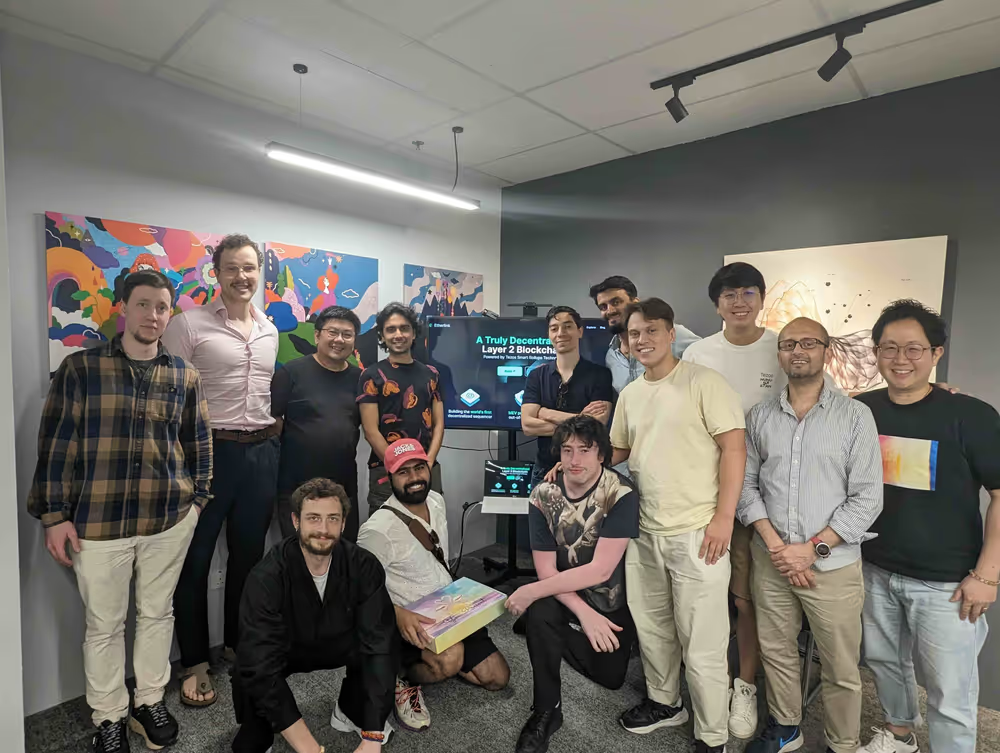Tezos Fuels DeFi Innovation: Highlights of DCA in Singapore
Explore the highlights of the DeFi Catalyst Accelerator in Singapore, showcasing six teams' innovations on Etherlink and Tezos, shaping the future of DeFi.
6 minute read

DeFi Catalyst Accelerator (DCA) has recently completed its initial two-week onboarding program in Singapore which is followed by a four-week fully remote program for participants worldwide. The onboarding phase provided an opportunity for participants to meet with industry experts, mentors, and investors to form valuable connections and collaborations that could help their DeFi projects succeed.
DCA has brought together six teams of early-stage innovators to develop the next generation of DeFi applications on the Tezos ecosystem. It aims to accelerate the development of projects on Etherlink, an EVM-compatible L2 rollup being built on Tezos.
During these initial two weeks, the startups were equipped with essential skills in design fundamentals, go-to-market strategies, and growth tactics. These valuable insights enabled them to create innovative and competitive strategies for their respective projects.
The six DeFi innovators taking part in DCA are:
- Hanji: On-chain order book trading
- Hashleap: Web3 payments and financial management platform
- Plend: Building 1inch for lending and borrowing in the EVM space
- Rivo: DeFi yield marketplace with smart contract wallet
- SaveX: Self-custody Web3 wallet
- StableTech: Consortium building open Tezos DeFi

Week 1: Charting new territories #
The accelerator began with welcome drinks and pizza to create a friendly atmosphere for future collaborations. The startups then participated in a series of workshops and masterclasses tailored to prepare them for their journey ahead.
Security-first design, led by blockchain security experts from Nethermind.
Solving the ‘cold start’ problem for early-stage startups, led by TZ APAC resident growth hacker and Fortify Labs mentor Julian Low.
Developing DeFi solutions focused on using the latest and most advanced methods with Trilitech’s head of DeFi, Nicolas Streschinsky, and his team.
During a roundtable on ‘The Importance of Liquidity and Market Making,’ GSR’s head of EMEA, CJ Fong, discussed the most effective ways to engage with major market makers.
Wilbert Johan, Web3 strategy and partnerships lead at Helix shared his experience building the DeFi community in Singapore.
In addition to group workshops, each project received personalized support and tailored assistance, including rapid audits and strategic guidance on future trajectories.
Quick audits: Swiftly identifying potential weaknesses to ensure that projects are built on solid foundations.
Guidance on OKRs and future strategies: Julian Low introduced the concept of north-star metrics, emphasized the importance of setting powerful yet realistic goals, and offered individualized support.
UI/UX and design support: Navi Arneja, a UX designer at Cryptonomic, provided UI/UX and design support, providing expert-led sessions followed by one-on-one reviews.
Security and infrastructure assessments: including advice on best practices.
During their breaks, the startups worked on their projects and attended events that drew prominent figures within the industry, including a Singapore web3 Startup Ecosystem panel co-hosted by SMU, a leading university in Singapore—featuring luminaries from GSR, Caladan, ByteTrade, and Pendle.
To conclude a week of events, sessions, and discussions, each team pitched their ideas to fellow buidlers, investors and the ecosystem at an extended breakfast co-hosted by GSR.
Week 2: Amplifying growth strategies #
As they developed and refined their projects, the second week focused on fortifying foundations, optimizing investment propositions, and amplifying growth strategies, spearheaded by Trilitech’s head of VC, Amar Odedra.
Workshop sessions delved into diverse facets of DeFi, UI/UX design, tokenomics, and platform gamification, supplemented by invaluable one-on-one support from industry experts and community advisors.
Design support #
Phil Hedayatnia, founder of Airfoil Studio, focused on the importance of user-centric design and advocated for seamless user experiences as the cornerstone of DeFi platforms.
Lisa JY Tan from Economics Design demystified tokenomics and economic design, paving the way for robust economic models.
Trilitech product designer Bahador Katouzian led workshops on improving UI/UX design, focusing on user flows and interfaces.
GTM strategies and growth tactics #
Ivan Hong, content lead at Request Finance, led a masterclass on content-led growth strategies, empowering startups with actionable insights for early-stage traction.
Julian Low returned to lead a session on customer acquisition and growth hacking.
DeFi GTM, growth & strategy sessions with:
- CJ (Ho Chang Jun), Chief Strategy Officer, Demex and Switcheo Labs
- Jason Thompson, Senior Advisor to Openspace Ventures
- Dr. Ernie Teo, Program Director, Nanyang Business School
Trilitech’s talent lead, Craig Law, discussed strategic partnerships and hiring strategies to create formidable startups that support growth.
Taisu Ventures extended its support by offering office hours and mentorship.
DCA’s first two weeks in Singapore concluded with networking at a VC dinner, facilitating connections between the startups and investors. This was followed by an overview of Etherlink’s roadmap and the positive growth of the ecosystem to set the stage for the weeks ahead.
DCA advances with ongoing support and development #
After completing a rigorous and hands-on in-person component in Singapore, DCA continues with four weeks of remote workshops and specialized support.
Thanks to the valuable expertise of everyone involved, the DeFi innovators have made strides toward delivering a minimum viable product for their respective projects.
For more updates, follow Etherlink on Twitter and Medium channel, and join the Etherlink Discord server.